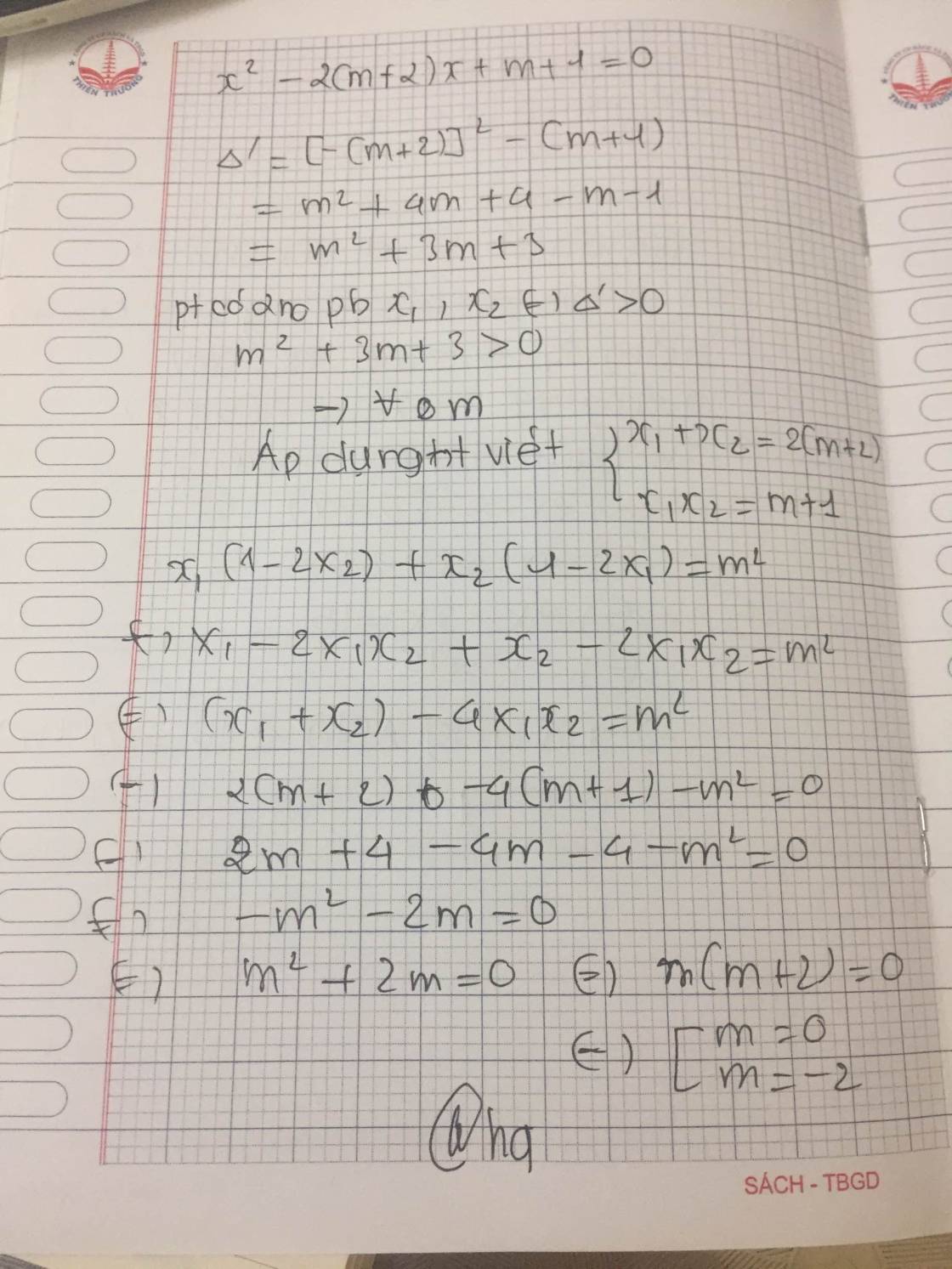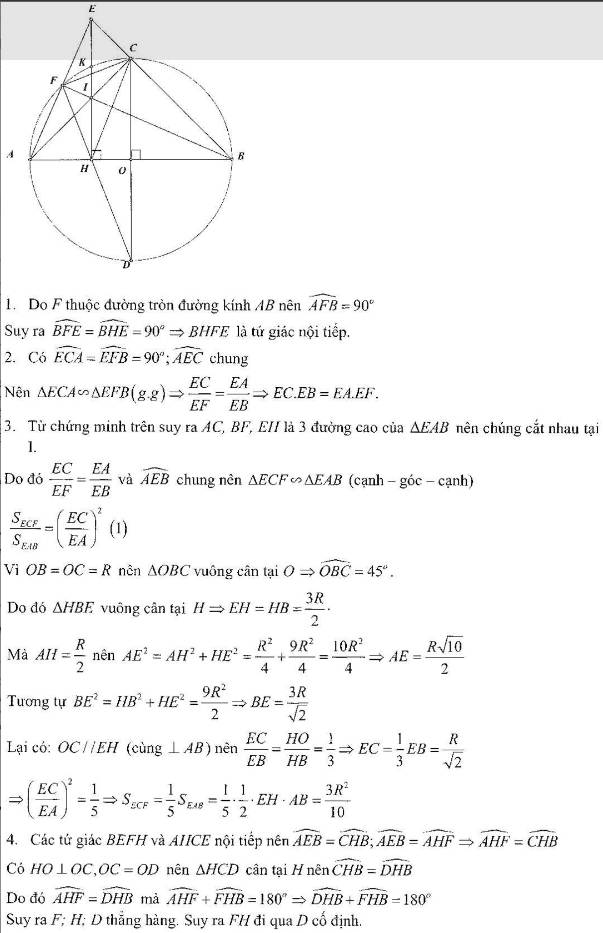cho hàm số y=x^2 và đường thẳng y=2x+3 cắt nhau tại 2 điểm A và B. Gọi D,C lần lượt là hình chiếu vuông góc của A và B trên trục hoành. Tính diện tích ABCD
Hãy nhập câu hỏi của bạn vào đây, nếu là tài khoản VIP, bạn sẽ được ưu tiên trả lời.


\(x^2-2\left(m+4\right)x+m^2+8m-9=0\left(1\right)\)
Ta giải \(\Delta=[-2\left(m+4\right)]^2-4\left(m^2+8m-9\right)=100>0\forall m\)
suy ra pt có 2 nghiệm phân biệt \(x_1,x_2\forall m\).
Ta có: \(x_1=m-1\), \(x_2=m+1\) (thay \(\Delta\) vào công thức tìm nghiệm phân biệt).
Gọi \(A=\dfrac{x_1^2+x_2^2-48}{x_1^2+x_2^2}\).
\(\Rightarrow A=1-\dfrac{48}{x_1^2+x_2^2}=1-\dfrac{48}{\left(m-1\right)^2+\left(m+1\right)^2}=1-\dfrac{24}{m^2+1}\).
Để biểu thức A nguyên thì \(\dfrac{24}{m^2+1}\) nguyên, suy ra \(m^2+1\inƯ\left(24\right)\).
\(\Rightarrow m^2+1\in\left\{1;2;4;6;8;12;24\right\}\)
\(\Rightarrow m\in\left\{0;\pm1\right\}\) (vì m nhận giá trị nguyên)
Vậy \(m\in\left\{0;\pm1\right\}\) là giá trị cần tìm.
Mình chỉnh sửa lại một chút nhé.
\(A=1-\dfrac{24}{m^2+2}\)
\(\Rightarrow...\)\(\Rightarrow\)\(m^2+2\in\left\{1;2;3;4;6;8;12;24\right\}\)
\(\Rightarrow m\in\left\{0;\pm1;\pm2\right\}\)
Vậy...

ĐKXĐ : \(x\ge-\dfrac{3}{8}\)
Ta có : \(\sqrt{8x+3}=9x^2+10x+\dfrac{9}{4}\)
\(\Leftrightarrow36x^2+40x+9-4\sqrt{8x+3}=0\)
\(\Leftrightarrow\left(36x^2+48x+16\right)-8x-3-4\sqrt{8x+3}-4=0\)
\(\Leftrightarrow\left(6x+4\right)^2-\left(\sqrt{8x+3}+2\right)^2=0\)
\(\Leftrightarrow\left(6x+\sqrt{8x+3}+6\right).\left(6x+2-\sqrt{8x+3}\right)=0\)
\(\Leftrightarrow\left[{}\begin{matrix}\sqrt{8x+3}=-6x-6\left(1\right)\\\sqrt{8x+3}=-6x-2\left(2\right)\end{matrix}\right.\)
Giải (1) ta có :
(1) <=> \(8x+3=\left(-6x-6\right)^2\) (với \(-6x-6\ge0\Leftrightarrow x\le-1\))
\(\Leftrightarrow36x^2+64x+33=0\)
\(\Leftrightarrow\left(6x+\dfrac{16}{3}\right)^2+\dfrac{41}{9}=0\)
\(\Leftrightarrow x\in\varnothing\) => (1) vô nghiệm
Giải (2) ta có
(2) <=> \(8x+3=\left(-6x-2\right)^2\) (với \(x\le-\dfrac{1}{3}\)) (*)
\(\Leftrightarrow36x^2+16x+1=0\)
\(\Leftrightarrow x=\dfrac{-4\pm\sqrt{7}}{18}\)
Kết hợp (*) và ĐKXĐ ta được \(x=\dfrac{-4+\sqrt{7}}{18}\) là nghiệm phương trình




pt hoành độ giao điểm của \(\left(P\right):y=x^2\) và \(\left(d\right):y=2x+3\) là \(x^2=2x+3\Leftrightarrow x^2-2x-3=0\) \(\Leftrightarrow\left(x-3\right)\left(x+1\right)=0\) \(\Leftrightarrow\left[{}\begin{matrix}x=3\\x=-1\end{matrix}\right.\).
Khi \(x=3\) thì \(y=x^2=9\), khi \(x=-1\) thì \(y=x^2=1\). Do đó (P) cắt (d) tại \(A\left(3;9\right)\) và \(B\left(-1;1\right)\). Từ đó dễ dàng suy ra \(C\left(3;0\right)\) và \(D\left(-1;0\right)\). Từ đó suy ra \(CD=4\).
Lại có \(AC=1;BD=9\). Do đó \(S_{ABCD}=\dfrac{\left(AC+BD\right).CD}{2}=\dfrac{\left(1+9\right).4}{2}=20\) (đơn vị diện tích)